Main CPGW Record
Surname: MORPHET
Forename(s): John Middleton
Place of Birth: Sedbergh, Yorkshire
Service No: 2619
Rank: L/Corporal
Regiment / Corps / Service: Duke of Wellington’s (West Riding Regiment)
Battalion / Unit: 1/6th Battalion
Division: 49th (West Riding) Division
Age: 38
Date of Death: 1915-08-22
Awards: ---
CWGC Grave / Memorial Reference: C. 5.
CWGC Cemetery: COLNE VALLEY CEMETERY
CWGC Memorial: ---
Non-CWGC Burial: ---
Local War Memorial: DENT, YORKSHIRE
Local War Memorial: SETTLE, YORKSHIRE
Additional Information:
John Middleton Morphet was the son of Thomas and Alice Morphet, née Middleton and brother-in-law of Driver Benjamin Haygarth (224473) (q.v.). John's father was born at Dent, Yorkshire and Alice at Liverpool, Lancashire, where her parents, John and Margaret Middleton, who were both born at Dent, had been 'Cowkeepers'.
1881 Sedbergh (Frostrow & Soolbank), Yorkshire Census: John M. Morphet, aged 4 years, born Sedbergh, son of Thomas and Alice Morphet.
1891 Sedbergh (Frostrow & Soolbank), Yorkshire Census: Hill - John Middleton Morphet, aged 14 years, born Sedbergh, son of Thos and Alice Morphet.
1901 Sedbergh, Yorkshire Census: The Hill, Soolbank - John M. Morphet, aged 24 years, born Sedbergh, son of Tom and Alice Morphet.
1911 Settle, Yorkshire Census: 1, Craven Terrace - John Middleton Morphet, aged 34 years, born Sedbergh, Yorkshire. [John was boarding with George and Elizabeth Close.]
The British Army Service Record for John Middleton Morphet exists but may be incomplete.
John Middleton Morphet is listed in the Nominal Roll of the 1/6th Battalion Duke of Wellington's (West Riding Regiment): L/Cpl J.M. Morphet.
British Army WW1 Medal Rolls Index Cards: Pte John M. Morphet, 6/2619, West Riding Regiment. Theatre of War first served in: ( - ) [1 - France]. Date of Entry therein: ( - ) [14 April 1915]. Killed in Action: 22 August 1915.
Army Registers of Soldiers' Effects: Lce-Cpl John Middleton Morphet, 2619, 1/6th Bn W. Riding. Date and Place of Death: 22.8.15. In Action. To whom Authorised/Amount Authorised: Father - Thomas. £11 18s. 11d.
A short biography of John is included in: ‘Sedbergh and District 1914-1918 – But who shall return the children?’ Compiled by Sedbergh and District History Society. Edited by Diane Elphick (2016).
See also: ‘Guiseley Terriers: A Small Part in The Great War – A History of the 1/6th Battalion, Duke of Wellington’s (West Riding) Regiment’ by Stephen Barber (2018).
Data Source: Craven’s Part in the Great War - original CPGW book entry
View Entry in CPGW BookEntry in West Yorkshire Pioneer Illustrated War Record:
MORPHET, Lance Corporal John, [Settle], aged 38, 6th West Riding Regiment, killed in action Aug, 21.
---
Click the thumbnail below to view a larger image.
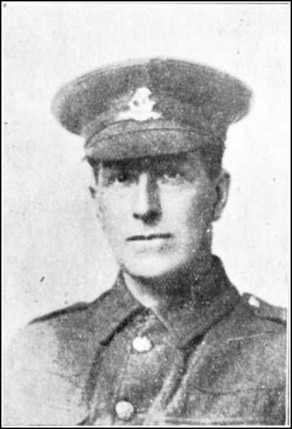
L/Corporal John Middleton MORPHET
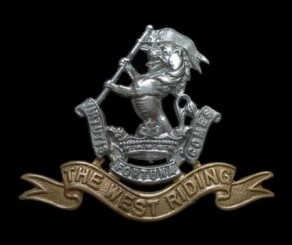
Regiment / Corps / Service Badge: Duke of Wellington’s (West Riding Regiment)

Divisional Sign / Service Insignia: 49th (West Riding) Division
Data from Soldiers Died in the Great War 1914 - 1919 Records
Soldiers Died Data for Soldier Records
Surname: MORPHET
Forename(s): John Middleton
Born:
Residence: Sedbergh, Yorks
Enlisted: Settle, Yorks
Number: 2619
Rank: L/Cpl
Regiment: Duke of Wellington's (West Riding Regiment)
Battalion: 1/6th Battalion
Decorations:
Died Date: 22/08/15
Died How: Killed in action
Theatre of War: France & Flanders
Notes:
Data from Commonwealth War Graves Commission Records
CWGC Data for Soldier Records
Surname: MORPHET
Forename(s): J M
Country of Service: United Kingdom
Service Number: 6/2619
Rank: Lance Corporal
Regiment: Duke of Wellington's (West Riding Regiment)
Unit: 1st/6th Bn.
Age:
Awards:
Died Date: 22/08/1915
Additional Information:
View Additional Text
View Additional Text For Soldier Records
'The Kendal Mercury' (3 September 1915)
(Kindly supplied by Sedbergh & District History Society)
DENT SOLDIER KILLED BY A STRAY BULLET
We regret to record the death of Lance-Corpl. John M. Morphet, of the 6th Duke of Wellington’s West Riding Regiment, at the front. He is son of Mr. Thomas Morphet, of Gawthrop, Dent, and a member of an old Dent family. For many years he has been School Attendance Officer at Settle, and was associated very closely with the Settle cricket team, for which he performed many useful feats with bat and ball. A letter of sympathy from his commanding officer to his parents tells he was shot by a stray bullet while repairing the trenches. His officer speaks in very high terms of the way in which he lived among the men. On Sunday evening the Rev. E.S. Curwen conducted a memorial service in Dent Parish Church. Throughout the dale much sympathy is felt with the sorrowing family.
‘The Westmorland Gazette’ (8 April 1916)
(Kindly supplied by Sedbergh & District History Society)
MRS. MORPHET, DENT
The death took place on Saturday of Mrs. Mary Morphet, of Helmside, Dent. She was in her 89th year, and was the oldest resident of the dale. She leaves a large number of descendants, children, grandchildren, and great-grandchildren. One of her grandsons was the late Lance-Corpl. John M. Morphet, who was killed in action in France last August. The funeral took place at Dent Church on Wednesday, and was largely attended.
View Additional Image(s)
Additional Photo(s) For Soldier Records
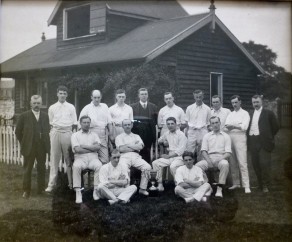
Settle Cricket Club - Winners ‘Ribblesdale’ League-Season 1914
Standing l-r: J. Cardus (scorer), H. Fenwick, J. Hayton, F. Ellis, J.W. Butterworth (vice-president), H. Bolt, R.N. Douglas, A.W. Sherwin, F. Grisedale, C.F. Armistead (secretary). Sitting l-r: J.M. Morphet, W. Clark, J. Grisedale, C.A. Milford (captain), G. Cardus, A. Parker
Courtesy of Settle Cricket Club
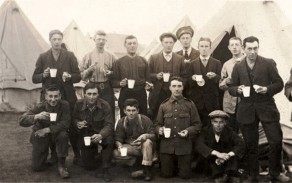
The 'Lucky 13' taken at Riby Park, Lincolnshire, October 1914
The group, that called themselves the 'Lucky 13', were serving with the 1/6th Bn Duke of Wellington's (West Riding Regiment) Back left to right - Walter Yates. Fred Close, Robert Clark, John M. Morphet (killed), Arthur Parker, Thomas Brayshaw, William H. Brassington (killed), William Hirst Front row, left to right - Charlie Parker, John R. Jackman (killed), John Cardus, Charles Peachey (killed), John S. Hepworth (killed)
Courtesy of The Brayshaw Library, Giggleswick School
View Craven Herald Articles
View Craven Herald Articles

03 September 1915
MORPHET – Killed in action in France. Lance Corporal Morphet, formerly school attendance officer at Settle, aged 38 years.
03 September 1915
DEATH OF A SETTLE CRICKETER AT THE FRONT
It was with a deep feeling of sorrow that the news was received last week by the inhabitants of Settle and district that Lance-Corporal John Middleton Morphet had been killed in action. He had been repairing a parapet with sandbags, and had got up to beat the sandbags down when a bullet entered his left arm and went through his heart, killing him instantaneously.
Lance-Corporal Morphet was 38 years of age, and up to 1905 was a solicitor’s clerk at Sedbergh. His parents, to whom much sympathy is extended, live at Gawthrop, Dent. In 1905 he was appointed school attendance officer at Settle, and had charge of the attendance at most of the schools in the area. His cheerfulness and courtesy made him exceedingly popular throughout his district, while in the immediate neighbourhood of Settle his prowess at football and cricket greatly enhanced his popularity. He played football in his earlier days with Kendal and Sedbergh, and afterwards played with Aston Villa and Burnley, and in his later days was the mainstay of either Settle or Giggleswick, with whichever team he threw in his lot. His best position was full back, and by his steadiness he had on many occasions saved his side. Often have the spectators said, “Now, Jack, take it off him,” and he was hard to beat.
On coming to Settle he joined the Cricket Club and was given a place in the team chiefly for his fast medium bowling. In his earlier seasons he met with no great success, but having developed slow leg break bowling in 1908 and onwards he became a terror to batsmen and a source of great strength to his side, as will be seen from his averages below. In the season 1914, when Settle won the Ribblesdale League Cup, the brunt of the bowling fell on Lance-Corporal Morphet and Lance-Corporal A. Parker, though both joined the forces before the completion of the cricket programme. To Lance-Corporal Morphet’s lasting honour he joined the army on the outbreak of war, in spite of the fact that he was above the then age limit. He will be mourned by a large number of friends, and the Settle district will miss the familiar figure of ‘Curlie’ or ‘Jack Morphet.’ In 1908 he had an average with the ball of 8.45, having taken 40 wickets for a cost of 338 runs; in 1900, 8.46 for 48 wickets at a cost of 417 runs; in 1910, 9.04 for 74 wickets at a cost of 669 runs; 1911, 11.87 for 54 wickets for 687 runs; in 1912, 8.76 for 87 wickets for 587 runs; in 1913, 85 wickets for 776 runs, average 9.12; and in 1914, 46 wickets for 466 runs, average 10.5. During the past seven years he had an average of over 11 wickets per year. 1n batting, he on many occasions helped his side to victory, and in 1909 his average was 12.8; 1910, 8.69; 1911, 20.36; 1912, 10.80; 1913, 12.76; and 1914, 11.6, so that he was certainly a source of strength to Settle.
Col. Birkbeck, in writing to the secretary of the Settle Cricket Club, said, “You and the Settle cricketers will be sorry to hear that Lance-Corporal J. M. Morphet has been killed. He was a fine follow and excellent soldier, always willing to do anything and always happy under the worst conditions. I am indeed sorry to lose him.”
From the Sergt.-in-charge (Sergt. W. J. Robinson, of Giggleswick) comes the following tribute:– “I feel the loss of Lance-Corporal Morphet very much as we were the only N.C.O.’s in the platoon from Settle since we came out first. Jack has been attached to us on his promotion. We have since slept together, dined together, and roughed it together, and of course knowing each other have shared each other’s ups and downs. He made himself a genial comrade and was a most promising N.C.O., and his loss is keenly felt by officers, N.C.O.’s and men. Whilst assiduous to duty he did not fail to take a lively interest in the recreative part of our life out here, and his hand and eye had not lost their cunning in a game of cricket. It may be said that a cricket ball was found in his pack, and I am sure he must have carried it a good few miles. Jack has played the game, he has taken up his stand in the innings and fought for his country; he has been bowled out. He did not suffer - it was short and swift. May he rest in peace. He was buried behind the lines and two Settle men, Pte. J. Ward and Pte. J. Tomlinson, attended his burial, the service being taken by Captain Case.”
Lance-Corporal Morphet’s name will for many years to come, whenever cricket is being played at Settle, be on the lips and in the minds of those who used to love to see him getting his opponents ‘ tied up.’
A Tribute from Hawes
The news that Corporal John M. Morphet, of the 6th Battalion Duke of Wellington’s Regiment had been killed was received in Hawes with feelings of profound regret and sorrow. Jack Morphet entered the employment of Messrs. J. W. Smith and Sons, woollen manufacturers, Hawes, about fourteen years ago, and after the mill was closed he entered the office of Mr. W. T. Metcalfe, assistant overseer, which he left to take up the post of school attendance officer at Settle. Morphet was a fine all-round athlete and excelled in every form of sport he took up. Whilst playing with Sedbergh he caught the eye of that famous football organisation Aston Villa, and signed on as a professional member of that club. He left the Aston Villa Club owing to leg trouble, but he also played for a season with Lincoln City. It was during his stay at Hawes that he applied for and received his reinstatement as an amateur. He was a member of the Hawes Football team for three seasons, and joint secretary for one year. His experienced and clever play soon became the model of the team, and the success which came to the Hawes Club in the after years was due in great measure to Morphet’s example and coaching. His connection with Hawes Cricket Club was a most successful one, and during the time he has lived at Settle he has played with his old team in one or two matches each season. “ Jack “ was the first cricketer to score a century on the Hawes Cricket Ground. This was his 110 against Middleham on Saturday, August 3rd, 07. On the Monday following (August 5th) he made the highest score that had been made at Hawes, viz., 158 not out, against Bradford Eastbrook. Good as he was with the willow he was even better with the ball and his wily deliveries have proved the undoing of many first-rate batsmen and many capable sides. On the cricket field, as on the ‘footer’ field, he was equally good, no matter in what position he was placed. Cricket and football did not exhaust his powers; he was a fine amateur quarter miler, and won hosts of splendid prizes in good company on several Yorkshire tracks. He was for two years a member of Hawes Church Choir. On the playing fields his methods were always scrupulously clean; he never stooped to questionable tactics, and foul play never provoked in him a like retaliation. He was a true type of English sportsman; victory never spoilt him; defeat never embittered him, and it was this spirit of true sporting comradeship which won him the respect, not only of his colleagues, but also his opponents, and made him a popular figure on every ground on which he played. His many cricket and football comrades in Hawes who have played with him in many a hard fought game, will ever cherish his memory and deeply mourn his loss. To his athletic power, Jack added a personal charm that was irresistible. Geniality, kindness, modesty, and unselfishness were the traits of his character, and endeared him to all who knew him; and who can doubt but that the elements of determination, coolness, grit and enthusiasm fostered and cultivated on the playing fields of Yorkshire were carried by him into that last great struggle and made him indeed as the letter from his Colonel stated, “A fine soldier, always cheerful, always willing.” The memories and tender recollections which he has left behind can never be obscured, nay, rather are they amplified, enriched, and beautified by his glorious death.
The family and countless friends of the deceased, in the time of their most poignant grief, have the consolation of remembering that in the supreme moment of life, in the hour of our Nation’s trial, Jack Morphet ‘played the man,’ and ‘Greater love hath no man than this, that a man lay down his life for his friends.’
Deceased, we understand, was 38 years of age, and engaged to be married to a Settle lady, the wedding having been arranged to take place after the war was over.
The Commanding Officer’s Testimony
On Sunday evening, the Rev. E. S. Curwen, vicar of Dent, made special reference to him in his sermon. As a straightforward, thoughtful, hard worker who won the esteem and respect of officers and fellow comrades, he was everything an Englishman ought to be. The Vicar then read the following letter received from the Commanding Officer by his parents.
August 23rd, 1915.
“I am very sorry indeed to have to inform you that your son, Lance-Corporal Morphet, was killed in the trenches last night. He was on duty repairing the trench when he was hit by a stray bullet which passed through his arm, and went into his left side, killing him almost instantaneously. It was a death which might have come to any of us at almost any time, and we can only say that it was God’s will, and express our sympathy with the people he has left at home. He was one of the soldiers we can least bear to lose; steady, thoughtful, and hardworking, and he had been a great help to some of the younger and less level-headed men. Off duty he has made friends with everybody, besides the Settle men he enlisted with, and the whole company will feel his loss very much. He is buried in a little cemetery about 300 yards behind the firing line with several others of our men who have lost their lives in these trenches. With deepest sympathy,
“Yours sincerely (signed) NICHOLAS GELDARD, 2nd Lieutenant ‘C’ Co., 6th Duke of Wellington’s Regiment.”
The service concluded with the hymn, ‘Now the Labourer’s Task is O’er,’ the organist (Miss M. A. Fawcett) playing as voluntaries ‘Crossing the Bar,’ and ‘O Rest in the Lord ‘ at the beginning and end of the service respectively.
01 October 1915
CONDOLENCE WITH TEACHERS’ FAMILIES
At a meeting of the West Riding Education Committee at Wakefield on Tuesday, a vote of condolence was passed with the family of the late Pte. Frederick Thornton, who was killed in action at the Front - the son of Mr. Thos. Thornton, Skipton - and formerly a teacher at the Skipton Parish Church Schools; also with family of the late Pte. J. M. Morphet, of Settle, who has laid down his life for his country.
View West Yorkshire Pioneer Articles
View West Yorkshire Pioneer Articles

25 June 1915
CRICKET AT THE FRONT
The following is a report sent by a Lance-Corporal in the Settle Territorials, who is at the Front:–
A cricket match of considerable interest was played between teams of ‘A’ and ‘C’ Companies of the 6th Duke of Wellington’s Regiment on Thursday evening, 17th instant. The ground situate between two burnt down farm houses, not far behind the firing line, was in a rough condition, dotted here and there with shell holes, and during the progress of the game, shells were bursting not far away on both right and left. The game was keenly followed by men of the companies concerned, with aeroplanes hovering over and around an old game in a new setting. The lads from Settle and Guiseley proved far too strong for the Skiptonians, as will be seen from the scores etc., below, Morphet and Claughton both bowled in fine style, and the men of ‘A’ Company put a very feeble show.
‘C’ Company
Lance-Corpl. J.M. Morphet b Burgess – 12
Pte. H. Claughton c E. Smith b Drummond – 2
Pte. H.M. Claughton c Petty b J. Smith – 20
Pte. Patterson b Lambert – 22
Pte. Chas. Parker c Lieut. Supple b Lambert – 7
Lieut. Whitaker lbw b Lambert – 3
Lieut. Geldard b Lambert – 3
Pte. F. Close lbw b Lieut. Supple – 0
Pte. J. Cardus not out – 11
Lance-Corpl. Denison b Lambert – 1
Pte. C. Peachy b Lambert – 0
Lance-Corpl. Arthur Parker b Lambert – 0
Extras – 16
Total – 97
‘A’ Company
Pte. Burgess c Peachy b Morphet – 4
Pte. Rimmer c Lieut. Whitaker b H.M. Claughton – 0
Pte. Drummond c Denison b Morphet – 0
Lance- Corpl. Ireland c Patterson b Morphet – 1
Pte. Petty c and b H.M. Claughton – 8
Pte. Kaye b H.M. Claughton – 0
Pte. J. Smith b H.M. Claughton – 5
Pte. Walton c A. Parker (wicket keeper) b Morphet – 0
Lieut. E.J.C. Supple c Lieut. Geldard b Claughton – 0
Pte. N. Smith b Morphet – 3
Pte. E. Smith b Morphet – 0
Lance-Corpl. Lambert not out – 0
Extras – 1
Total – 22
A HUMOROUS ANNOUNCEMENT
In connection with the above event Mr. T. Brayshaw, J.P., drew up and caused to be posted in Settle the following announcement:
GREAT CRICKET MATCH!
SPECIAL ATTRACTION!!
On Friday, June 18th (Military Duties, Germans, and weather permitting), it is intended to have a grand Cricket Match,
SETTLE v SKIPTON,
in a field at Fleurbaix (N.W. France), the teams being selected from the men of the above two towns now on active service with the 1st 6th Batt. Duke of Wellington’s Regiment.
In order to promote the comfort of the spectators the locality will be carefully cleared of all German snipers beforehand, and visitors will be allowed to carry away fragments of any German shells that may fall on the Cricket Field during the progress of the game.
N.B. – There are still one or two vacancies ‘at the front,’ in case any unmarried young men from Settle wish to join the above teams.
GOTT–STRAFE–SKIPTON
27 August 1915
A WELL-KNOWN SETTLE CRICKETER KILLED
The sad news that Corporal John Morphet, of the 1/6 West Riding Regiment, or Territorials, had been killed in action last Sunday night, was received in Settle yesterday with manifestations of grief on every hand. It appears that whilst mounting a parapet he was struck down and instantly killed by a German bullet.
A Correspondent writes:– “Jack” Morphet, to use the familiar name by which he was known throughout a wide district, came to Settle some years ago, and up to the time of his enlistment held the post of school attendance officer. Possessed of a very genial personality and many manly qualities, he soon drew to himself a large circle of friends, whilst his powers in the field of sport quickly gained him a host of admirers. He will be greatly missed in the recreative life of the town, and especially where men meet together in the manly games of cricket and football.
His clear eye, swinging gait, and athletic figure were symbolical of the man, for “Jack” Morphet was an athlete from head to foot. No game amiss to him, but it was in the national summer and winter games of cricket and football that he excelled. A fine all-round cricketer, he always played the game for sheer love of it, and his successful bowling and batting performances brought him an enviable reputation in the Ribblesdale League. Many indeed are the feats he has accomplished on the Marshfield ground and on the other playing grounds of the league. Moreover, it may be safely said, he gained the respect of every opponent against whom he came.
At football, too, he had a wide reputation, and the premier association league clubs have more than once cast eyes in his direction. Always cool and steady himself, as though at practice – his steadying influence was always felt in the team, and his cheery advice to his fellow players was always accepted and acted upon with alacrity and benefit. The players of many clubs throughout Craven and the Hawes and Sedbergh district, where he resided before coming to Settle, will learn with sorrow the sad news of his death. Never defeated until the game was lost, he could place his back to the wall and fight an uphill game against any odds, always in the same cheery optimistic manner that hose who have watched him know so well. But the defeat of his side accomplished, he accepted it in the true spirit of sportsmanship. No less noticeable was his modesty in the hour of success, and those qualities made him a popular figure on every playing ground with the opponents and spectators alike.
When the war broke out, with other members of the Settle Cricket Team, he threw aside bat and ball and enlisting in the local Territorials prepared for the stronger game of war and went to France with his battalion. The letter of his Colonel conveying the sad news of his death in which it is stated:– “He was a fine soldier, always cheerful and willing” shows that he carried with him on the battle fields of France and Belgium those qualities which he learnt, and which stood him in such good stead on the battle fields of Craven – qualities which endeared him to such a host of friends.
Settle people will extend their sympathy to those who were near and dear to him and mourn with them in their loss.
“Jack” Morphet leaves behind him memories too numerous to set out in this short appreciation, but those who have watched his grit and sturdy defence in a tight corner when in friendly rivalry, will have no difficulty in conjuring in their minds the sight of him cheerily facing the foes of his country when the stakes at issue are not a silver cup or medal, but freedom and right. It is sad to think that we shall see him no more, but knowing him as we did, what nobler or more fitting tribute could be paid to him than to remember that he died fighting on the battlefields of Belgium as he fought on the playing fields of Craven, “playing the man.” R.I.P.
03 September 1915
THE LATE LANCE-CORPORAL MORPHET OF SETTLE
As reported exclusively in the ‘Pioneer’ last week, Lance-Corporal Morphet, of Settle, was killed in action. The news was received in Settle and district with the utmost regret, as Mr. Morphet was a well-known and popular figure. It appears that he had been repairing the parapet with sandbags, and had got up to beat the sandbags down, when a bullet entered his left arm and went through his heart, killing him instantaneously.
Lance-Corporal Morphet was 38 years of age, and had previously been a solicitor’s clerk at Sedbergh. His parents, to whom much sympathy is extended, live at Gawthrop, Dent. In 1905 he was appointed section attendance officer at Settle, and had charge of the attendance at most of the schools in the area. His cheerfulness and courtesy made him exceedingly popular throughout the district, while in the immediate neighbourhood of Settle his prowess at football and cricket, as we have already stated, greatly enhanced his popularity. He played football in his earlier days with Kendal and Sedbergh, and afterwards played with Aston Villa and Burnley, and in his later days was the mainstay of either Settle or Giggleswick, with whichever team he threw in his lot. His best position was full back, and by his steadiness he, on many occasions, saved his side. Often have the spectators said, “Now, Jack, take it off him”, and he was bad to beat.
On coming to Settle he joined the Cricket Club, and given a place in the team chiefly for his fast medium bowling. In his earlier seasons he met with no great success, but having developed slow leg break bowling in 1908 and onwards, he became a terror to batsmen and a source of great strength to his side, as will be seen from his averages below. In the season 1914, when Settle won the Ribblesdale League Cup, the brunt of the bowling fell on Lance-Corporal Morphet and Lance-Corporal A. Parker, though both joined the forces before the completion of the cricket programme. To Lance-Corporal Morphet’s lasting honour he joined the Army on the outbreak of war, in spite of the fact that he was above the then age limit.
In 1908 he had an average with the ball of 8.45, having taken 40 wickets for a cost of 338 runs, in 1909 8.6 for 48 wickets at a cost of 417 runs, in 1910 9.04 for 74 wickets at a cost of 669 runs, 1911 11.87 for 45 wickets at a cost of 587 runs, 1912 8.76 for 67 wickets at a cost of 587 runs, 1913 85 wickets for 776 runs average 9.12, and in 1914 45 wickets for 465 runs average 10.5. During the past seven years he had an average of over 50 wickets per year. In batting he on many occasions helped his side to victory, and in 1909 his average was 128, 1910 8.59, 1911 20.35, 1912 10.86, 1913 12.76 and 1914 11.6.
Colonel Birkbeck, in writing to the secretary of the Settle Cricket Club said: “You and Settle cricketers will be sorry to hear that Lance-Corporal J.M. Morphet has been killed. He was a fine fellow and excellent soldier, always willing to do anything and always happy under the worst conditions. I am indeed sorry to lose him.”
From the Sergeant-in-charge (Sergt. W.J. Robinson, of Giggleswick) comes the following tribute:– “I feel the loss of Lance-Corporal Morphet very much, as we were the only N.C.O.s in the platoon from Settle, since we came out first. Jack has been attached to us on his promotion. We have since slept together, dined together and roughed it together, and, of course, knowing each other shared each other’s ups and downs. He made himself a genial comrade, and was a most popular N.C.O., and his loss is keenly felt by officers, N.C.O.s and men. Whilst assiduous to duty, he did not fail to take a lively interest in the recreation part of our life out here, and his hand and eye had not lost their cunning in a game of cricket. It may be said that a cricket ball was found in his pack, and I am sure he must have carried is a good few miles. Jack has ‘played the game’. He has taken up his stand in the innings, has fought for his country, and he has been bowled out. He did not suffer, it was short and swift. May he rest in peace. He was buried behind the lines, and two Settle men, Private J. Ward and Private J. Tomlinson, attended his burial, the service being taken by Major Oaks. Lance-Corporal Morphet’s name will for many years to come, whenever cricket is being played at Settle, be on the lips and in the minds of those who used to love to see him getting his opponents ‘tied-up’.
MEMORIAL SERVICE AT DENT
On Sunday evening last special reference was made by the Vicar of Dent to the recent death of Lance-Corporal Morphet. He read a letter received by his parents, Mr. and Mrs. Morphet, of Gawthrop, written by his commanding officer, in which the sterling qualities of the deceased were highly spoken of and deep sympathy expressed for his parents thus bereaved. Throughout the dale sympathy is felt for the sorrowing parents.
24 December 1915
CRAVEN’S ROLL OF HONOUR – SETTLE
Lance Corporal John Morphet, 6th West Riding (Duke of Wellington’s) Regiment, killed in action on August 21st. School attendance officer at Settle for many years. A well-known local sportsman. Thirty-eight years of age.
04 January 1918
SETTLE’S FALLEN HEROES
Memorial Service at the Parish Church
A memorial service for the Settle soldiers who have fallen in the war was held at the Parish Church last Sunday afternoon. There was a large congregation, and the service was conducted by Rev. W. E. Linney (vicar). The hymns ‘God of the living in Whose eyes,’ ‘Jesus lives,’ ‘On the resurrection morn,’ and ‘ O God our help in aged past’ were sung, and the ‘Last Post’ was sounded at the close of the service by two of the local Cadets. The organist (Mr. F. Lord) also played appropriate music as the congregation assembled and left the church.
The Vicar, in the course of his sermon, said they were met to remember the Settle soldiers, men, and boys – some indeed little more than boys – who had laid down their lives for the country at the war, whether during the year which was just drawing to a close or in the earlier stages of the conflict. When he asked them to remember those heroes that day, he knew that he was asking them to do what they were always doing. They were their own dear ones united to many of them by ties of blood – husbands, fathers, brothers, sons, as well as friends. How could they forget them? Were they not reminded of them day by day by the gaps in their home circles, which could never again be filled by them? They all desired in their hearts that God would bless and keep them, and give them peace. and happiness. The Vicar then read the following list of the Settle men who had laid down their lives:– John Edward Bell, Geo. S. Belles, Fredk. Baldwin, John Barrett, Robert Bateson, William Bradley, Frank Bulcock, George R. Bullock, Herbert Clark, John Cokell, Edward Ellershaw, Jas. Ewart, Wm. Ewart, Fredk. Frost, Harold Goss, Alfred Gower, Joseph Lord, John Morphet, John Packard, Chas. Peachey, Thomas Howarth Preston, Albert Ralph, Thos. Stackhouse, George Edward Turner, Derwent Turnbull, Wm. Troughton, Harry Walton, John Edward Wilson, Ernest Wooff, and Robert Wooff. Proceeding, the Vicar said they had a responsibility with regard to those men. They owed them a debt, and he trusted and believed that they were wishful to do all that they could to repay it. “ Our lives are being saved by their death. If we have any future before us on the earth it is because they gave up their futures to secure it. Their right to survive was as good as our own. Many of them would have been of far more use in the world than we can hope to be. The future stands to be only poorer for our surviving in their stead. We are debtors to them for all they have given us. To the future think of all it has lost in them.” How were they going to pay the debt, and in paying it to honour their heroic dead? Surely there could be but one answer – to live to give effect to their ideals. When they were asked what those ideals were, they might be well put in the words of Bishop Walshaw How’s hymn written for the diamond jubilee of Queen Victoria, “To make the world a better world for man’s brief earthly dwelling.” If Prussian militarism should gain the ascendancy the world would be scarcely a fit place to live in. What they wanted was the triumph of right and liberty. That was the task they had begun, and many of them, fired by the enthusiasm of a noble cause, literally went singing to their death. The old life which had no loftier aim than a high standard of material comfort had been felt to be unsatisfactory. To ardent youth the higher spirit of self-sacrifice, which was the spirit of Christ, beckoned onward with irresistible attractiveness, and they followed the gleam. They had yet to complete the great task to which they dedicated themselves. That was the way they could honour the memory of their fallen heroes, and with confidence that they had not died in vain.
A collection taken on behalf of the Red Cross Society realised £5 15s.
Comment on this Soldier Record
You can leave comments on this soldier record. Please note all comments will be manually approved before they appear on the website.

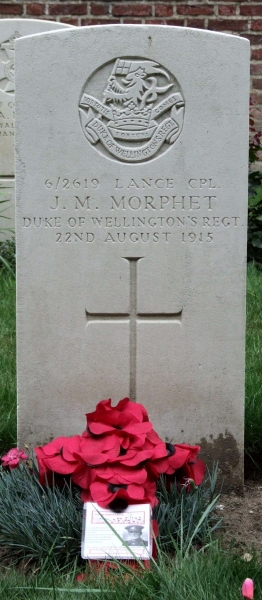
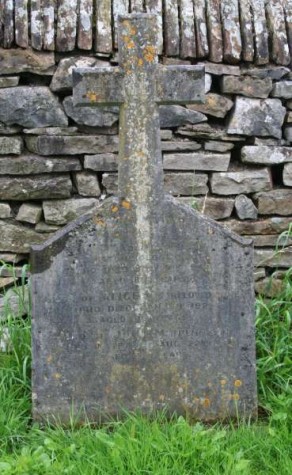




John Middleton may have been related to me.
My family came from Settle well known as my Grandad played cricket for Settle. John Grisedale. In around the 1920s.
He married a Letitia Morphet.
My family owned the Grisedale Follies in Settle and an uncle owned the cinema.
I think my Grandad once bowled out a team for a little runs.
He used to brag to us about that.
Just was interested.